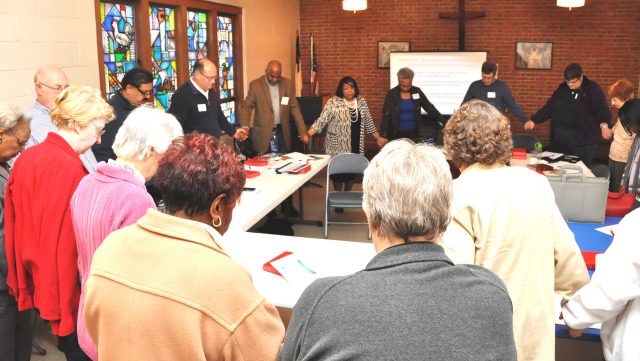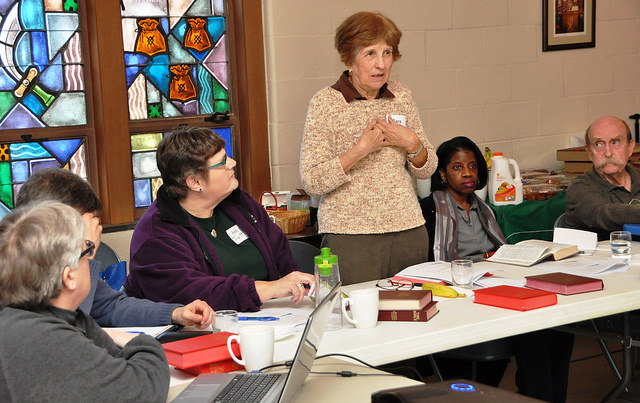A supplement to the NEWSpirit Winter 2017 article,
“District dialogues offer ‘real talk’ about race”
At our request, a number of clergy participants in recent racial dialogue and learning events, sponsored by four districts, kindly shared their reactions and reflections with us. They answered several questions, and we collected and combined each of their answers into single, sometimes lengthy comments with minimal editing.
Their candid statements reveal an acknowledgement, for most, of the value and necessity of these face-to-face discussions, especially those that have the benefit of being interracial. Indeed, they are not a panacea for our society’s pervasive racism, ignorance and bigotry, nor the other prisons of the heart that keep us bound. But the gracious offering and acceptance of honest impressions, confessions and helpful truths, although they may be difficult to share, can still, in the end, “set the captives free.”
We invite and welcome more reactions and insights from these and future racial dialogues. And we certainly invite our thoughtful readers to join in the conversation. Write to us at communications@epaumc.org or comment on our Facebook page.
Central District Dialogue, Dec. 3, 2016.
The Rev. Mary Catherine Miller, Central District Office
(Sharing an overview of participants’ post-session evaluations)
Evaluations were anonymous and included. It was felt that it was a timely topic, that the workshop itself encouraged introspection and self-awareness; that in our short time together we only just began to touch on the “heartache in our country regarding divisiveness, hate…and racism” in order to lay a foundation for healing. A desire was expressed to keep the conversation going. Personalized next steps were established, as well as a way to check in with folk in two months time to see how they were doing with their next steps.
The Rev. Mark Young, First UMC Phoenixville
(Racial dialogue) is absolutely needed; and I definitely found it worthwhile. If the church cannot openly and honestly talk among its own members, how can we ever talk with the world? Racism and its effects, visible or hidden, are so much a part of our social structure that (a white man speaking here) I overlook them far too often and need the reminders. It is important that we keep up this ongoing emphasis because it could easily get lost amidst every other outrage that comes our way with increasing frequency.
Dr. (Anita) Powell wanted to emphasize the immediate effects of the presidential election and the atmosphere of blatant bigotry that it has seemingly permitted. I had never considered Dr. (Helen) Fleming’s stance that racial division is one deliberate attempt to keep Christians from recognizing our full unity with one another. She wanted to address how the power of God can touch anyone’s heart and heal anything there.
I would have liked to have heard the perspective of someone under 35 years old. The rest of us carry baggage that they don’t, and I think they see more clearly the direction that we will need to take in the future.
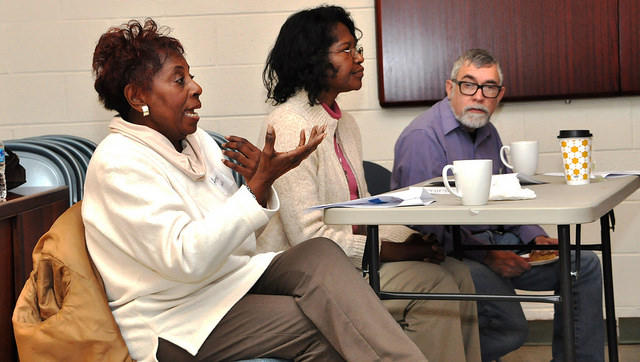
The Rev. Angela Kellie Ebo, Emmanuel UMC
What I observed was that it did not seem odd (and it should have) that some of the participants themselves didn’t find it disturbing or unusual that they have no contact with persons of color outside of the church.
I grew up in an all-white, Irish Catholic neighborhood, attended predominantly white schools. I believe these types of sessions/classes are reaching for something that will… what? I don’t believe these sessions in this day in time will promote or open the door for better attitudes, dialogues or mindsets.
I believe if the conference is going to continue on this path, with the districts’ support, then perhaps some “intentional partnering” for worship services may be the route that is needed—like maybe pulpit exchanges for one Sunday, or how about a “church exchange” for one Sunday? For example, have a Main Line all-white church have their entire service in an all-black neighborhood church and vice-versa. I believe this may be the only way to ascertain the degree of the racial barriers that are present.
The Rev. Jacqueline Hines, Bethel UMC, Spring City
The time was a blessing to me because it was cathartic. Dr. (Anita) Powell’s call for our action plans was a powerful reminder that each of us needs to make a commitment. My primary thoughts are on the aftermath of the election and the brutal, confusing reality it exposed. Crisis often brings us to our knees, where we belong and where we are most effective. The problem is while some of us are on our knees, others are plotting to plunder. Prayer helps us to endure it all.
Southeast District Dialogue, Jan. 16, 2017
The Rev. Mark Terry, Oxford UMC
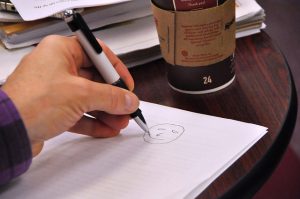 I think they did a good job of developing a safe space for people to share, and I liked temporarily living in the “Left-Handed World,” to get a sense of what it is like to be an outsider. I think the face-drawing exercise (originally developed by Garlinda Burton) is something that I will use to help white people understand how disconnected they actually are from the experiences of people of color.
I think they did a good job of developing a safe space for people to share, and I liked temporarily living in the “Left-Handed World,” to get a sense of what it is like to be an outsider. I think the face-drawing exercise (originally developed by Garlinda Burton) is something that I will use to help white people understand how disconnected they actually are from the experiences of people of color.
Honest dialogue about racism is needed, and I hope events like these will lead to more opportunities and more people taking advantage of them, such as the dialogues on whiteness that Church of the Open Door will sponsor and our Tools for Ministry training in April.
Along with the positive from the evening, I was struck again by the sobering reality that it is long, hard work for white people to see and address their white privilege; and it is the sort of work we generally try to avoid. How do we come to understand that there is great beauty in the future of the world that we won’t see if we don’t first open our eyes to the privilege we are still unfairly enjoying in the present?
The Rev. Mercedes Case, Avondale UMC and New London UMC
What impressed me the most was the unity in the room. Everyone was there because they wanted to learn from one another, talk together with respect, care and love, and become more aware of the issues, concerns and challenges that affect our churches, our community and our country, as well as our own relationships with people. It felt like we were ‘all in this together’ as people of God who truly wanted to do something about racism and the “isms” of our world.
I admit, at first I was apprehensive and uncomfortable about attending something like this. But the openness of the discussions between all the participants and especially the small groups I was in made me feel more comfortable to talk about hard issues in a diverse setting. Sitting together, sharing stories and experiences brought me insights into the issues of racism that I would not have had the opportunity to hear elsewhere.
As a white person, settings like this give me the opportunity to really hear from people who are not like me in a safe place to ask the hard questions, hear the difficult answers and to wrestle with how to respond. That’s why things like this are valuable and important. I am realizing I live a very insulated life and this dialogue experience has motivated me to expand my relationships.
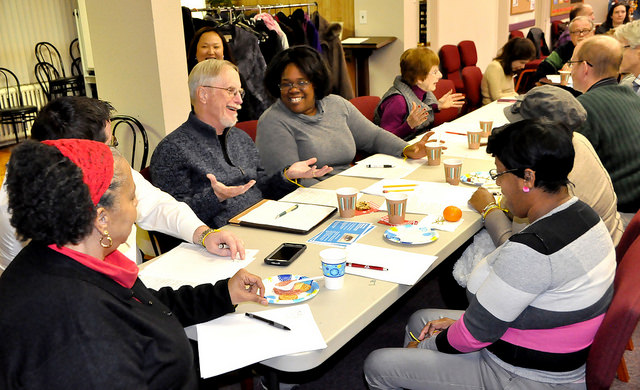
The Rev. Lydia Muñoz, Church of the Open Door UMC, Kennett Square
The team that led the dialogue for the Southeast had a debriefing the Sunday after the event. Our initial reaction was that the people who were there were ready and willing to receive the message which makes a big difference when trying to have this conversation. For lack of a better term, we were sort of preaching to the choir. However, it was also clear to us that there is a lack of understanding or clarity around the social construct of race, implicit bias and developing intercultural competency. These are terms that have multiple layers of definitions, and they need to be unpacked with tender care and intentionality.
The personal witness from our white brothers and sisters, including the powerful opening devotion from our DS, showed how they were all willing to share their story of how God’s Spirit helped them come to an understanding. They needed to confess that they are recovering racists and that they are learning everyday how to “move on toward perfection.” This was a powerful moment in our time together.
What we also were aware of was that people really wanted to have time to wrestle with each of the components that were presented, including the dynamic of only being allowed to use your left hand. People wanted more time to discuss and share. We will need to build in more of that next time.
Another observation for us was that for many people of color, being in a conversation like this with our white brothers and sisters is not always safe. Dynamics around internalized oppression and having to carry the burden of being the ethnic minority in the room is a heavy burden for most of us. It would probably be good next time for us to separate the two groups for a time of sharing in their own contexts, so that we do no harm.
We had good responses and eagerness to continue; so we look forward to working with our DS for more opportunities in the near future. This is an ongoing conversation, and we recognize that when we engage in these conversations it is the work of Christian Discipleship taking place. It is a “means of grace.”
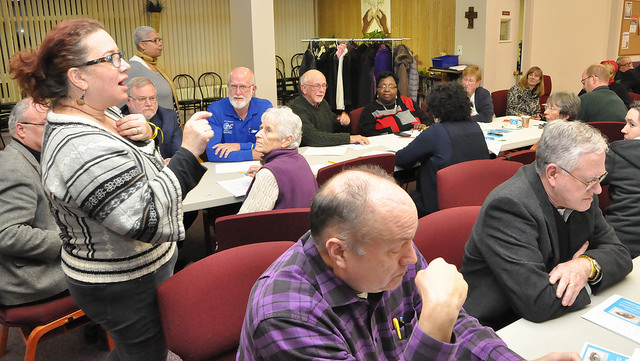
The Rev. Diana Esposito, Grove UMC
When attending the Southeast District Night of Dialogue, I was very impressed with the way in which racism was presented from a number of angles. We were involved in activities and conversations, in addition to some interesting, information-rich presentations.
Throughout the evening, right-handed people were asked to use their left hand for all tasks. We were reprimanded when we slipped. At the end of the evening we were presented with not only the way a left-handed person faces daily experiences, but also the way in which theology is unknowingly used to disparage left-handed people. There were immediate and obvious ties to the ways in which unconscious racism is depicted in everyday encounters and theology.
There is great value in these kind of conversations, as we seek to shed light on and deconstruct white privilege. Without these kinds of conversations we just keep going the way we have been, and passive racism continues to run rampant in the hearts and actions of even the most well-meaning people.
Southwest District Dialogues
The Rev. Jason Perkowski, Faith UMC and Oregon Community UMC
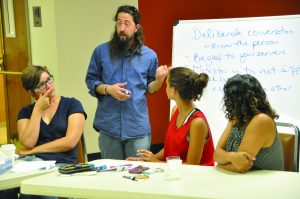 I would agree with the statement that to a certain extent we are “preaching to the choir” in our Racial Justice Dialogues here in the Southwest District as well. But we are excited about the Tools for Ministry training event, when we will do some work regarding racism and social justice, and have a larger swathe of the district involved, rather than just those few who choose to come out for the Racial Justice Dialogues that we periodically host. We have had several meetings with good attendance and very honest dialogue about our experiences with racism, as well as other acts of discrimination. This has included confessing to times when we have been involved in causing harm on our part in direct or systemic acts of racism, as well as times when we have experienced various forms of oppression/discrimination no matter our background.
I would agree with the statement that to a certain extent we are “preaching to the choir” in our Racial Justice Dialogues here in the Southwest District as well. But we are excited about the Tools for Ministry training event, when we will do some work regarding racism and social justice, and have a larger swathe of the district involved, rather than just those few who choose to come out for the Racial Justice Dialogues that we periodically host. We have had several meetings with good attendance and very honest dialogue about our experiences with racism, as well as other acts of discrimination. This has included confessing to times when we have been involved in causing harm on our part in direct or systemic acts of racism, as well as times when we have experienced various forms of oppression/discrimination no matter our background.
We have been able to affirm the need to keep working together toward healthier relationships–including using healthier means of interaction and language. More awareness has been developed about the injustices that take place through even subconscious acts of privilege. And we have each committed to avoid repeating mistakes of the past.
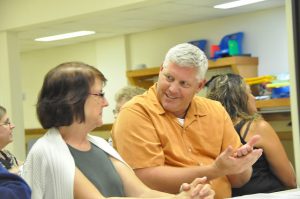 The most poignant outcome so far is an increasingly urgent desire to find ways to connect diverse congregations through activities and opportunities that will promote authentic and long-term relationships between individuals and congregations. We are struggling with the segregated nature of worship communities and the segregation among our towns. We are discerning how to overcome those barriers carefully so that we do no harm. But we are also aware that we have to do something, because inaction and the status quo are not acceptable.
The most poignant outcome so far is an increasingly urgent desire to find ways to connect diverse congregations through activities and opportunities that will promote authentic and long-term relationships between individuals and congregations. We are struggling with the segregated nature of worship communities and the segregation among our towns. We are discerning how to overcome those barriers carefully so that we do no harm. But we are also aware that we have to do something, because inaction and the status quo are not acceptable.
Some possibilities for action that we have discussed include pulpit swaps, fellowship and service opportunities with participants from diverse congregations, encouraging members to visit diverse churches individually, providing deliberate teaching about and experiences with different cultures–including worship styles, holiday traditions, foods, etc.
Becoming aware of and beginning to dismantle racism within ourselves and our culture is a slow process, but it is a journey that we are committed to walking together.
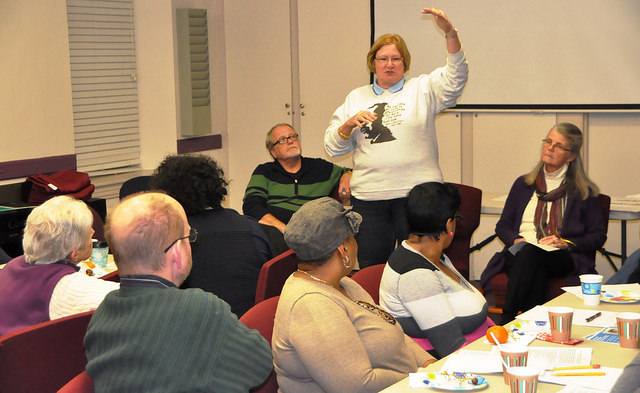
East District Dialogue, Jan. 20-21
The Rev. Andrew L. Foster, III., Janes Memorial UMC, Philadelphia
I found the dialogue and video presentation (the documentary film “13th”) to be helpful because it was presented in a “non-threatening” manner. I believe it was beneficial because it did not have an agenda beyond dialogue and sharing. One of the most important bits of information I learned was the loophole in the 13th amendment (allowing prisoners to be subjected to the practice of slavery— forced, unpaid labor—outlawed by the 13th Amendment to the U.S. Constitution).
I was neither comfortable nor uncomfortable primarily because the topic is an everyday experience for me as a black man in America. I sat at a table with both black and white, clergy and laity, and our table discussions were open and honest. I did not perceive any levels of discomfort.
This kind of experience is needed and has great value, especially considering our current political climate (world and church). I believe there need to be more consistent conversations around race relations with action steps to achieve real unity. I am always ready to listen and learn other perspectives and cultural norms in the context of the church. However, I really think this event would have been addressed and experienced differently had it been in the city or in an urban context.
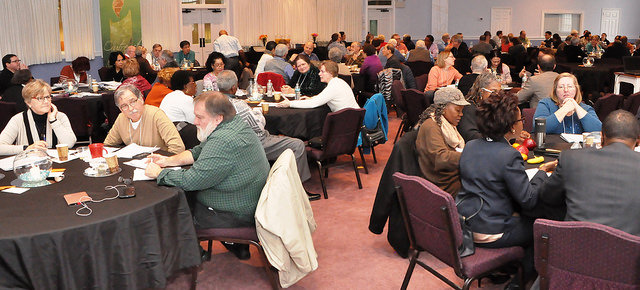
The Rev. Dorry Newcomer Newtown UMC
When my district superintendent, Rev. Tracy Bass, announced the Conversations on Race Relations workshop, he assured us it would be a constructive time together. I was a little nervous about it, because of the tense times we are living in and because my Healing the Wounds experience many years ago was pretty rough.
But I felt immediately put at ease. The people of Washington Crossing UMC did an outstanding job of welcoming us and providing hospitality. Rev. Bass had a clear agenda for our time together and balanced large group and small group sharing. The atmosphere in the room was one of collaboration rather than blame. I felt we had enough trust in each other to actually have true conversation, the kind of dialogue that leads to conversion. That in and of itself, I thought, was a pretty remarkable feat. I left the weekend with a lot more hope than I had when I arrived.
I think it is that hope that makes all the difference. St. Augustine said, “Hope has two beautiful daughters–anger and courage. Hope depends on anger over what could be but is not and on courage to make it different.”
One goal of the retreat was to help us see how life for African American men in particular is different from life for most Americans. I was shocked to learn that while one in 17 white males enter the criminal justice system in their lifetime, that figure is one in three for African American males. What a heart-breaking statistic, the roots of which go way back in American history.
What is it about human nature that we delight in and are willing to profit from having power over someone else? This is not what God created and called good. At many points in the weekend I was angry at my fellow human beings, and myself.
A few days after the workshop, participants received email from Rev. Bass, thanking us for attending and offering some ideas for next steps. I have been giving that a lot of thought. How am I going to “work out my own salvation” in this area?
Recently, one of my church members gave me a compilation of the Golden Rule as it is understood in various world religions. Taoism teaches, “Hold as your own the gains of your neighbor and as yours his losses.” I signed up for the Conversations on Race Relations thinking, as a white woman who pastors an almost all-white church, in a largely white community, that I don’t really have much to contribute to a conversation on race relations. Now I think I have a lot to say!
The Conversations on Race Relations weekend opened my eyes to some of the challenges faced by African Americans, and it put before me the truth that distorting the humanity of one group means we are all missing the fullness of God’s intention for us. I am not sure how best to proclaim this message to others. But I pray that I will have the courage to stand up and speak as the Lord leads.
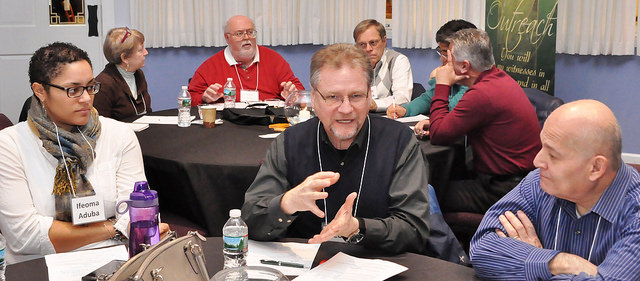
The Rev. Cynthia Brubaker, Lighthouse Fellowship UMC
“Walking With: The African-American Experience” was really good. I think the table I sat at was a big factor in my experience on Saturday because the majority of people were African-Americans who welcomed and engaged me.
I had already watched Tavis Smiley’s two-part documentary on Dr. Martin Luther King Jr. and the PBS doc “After MLK: And Still I Rise”—both the day before we viewed “13th.” So I was ready to hear and engage, too. Each doc taught me something I didn’t know and added to my limited understanding. By the time “13th” was over I felt like I had a rounder, more complete understanding. “13th” has a stunning way of connecting the dots and creating a continuum of insight that overflows into our current experiences.
Besides connecting everything together in a way I had never understood before, “13th”s entire segment on ALEC (American Legislative Exchange Council) was mind-bogglingly disturbing. I knew nothing of that or of the mass incarceration of freed slaves after the Emancipation Proclamation. I had only learned about the plight of sharecroppers but not the sickening part that profit played and continues to play in the prison system.
Previous racial learning experiences were awkward at best and painful at least. As I said, our table’s participants were willing to (for the most part) share and be open with me. So my experience was quite uplifting, and invitations to get together were offered and accepted. Really wonderful!
I heard an ongoing unwillingness among a number of mostly white male participants to accept any culpability or even to accept the viability of some of the points made about others’ experiences. To me, this came out in protective remarks toward the police and other authorities, or a desire to give others help or information without personally being involved.
I think this experience is obviously needed. Listen to the remarks in the room. Look at the outcomes in our country and the world. We are divided and mostly unwilling to hear and accept the truth about ourselves and others, or to see others as equally beloved and worthy.
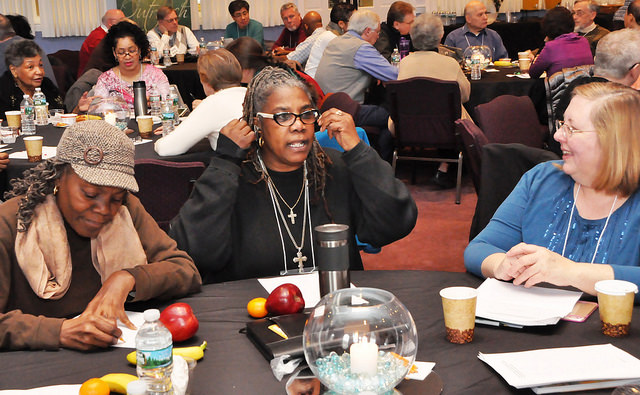
The Rev. Jackie Anne Stewart, Bickley’s New Beginning UMC, Philadelphia
The discussion was informative and brought awareness to an issue that many of us have experienced in various situations of life. It allowed me to see that our leaders are not asleep on this issue but are actively leading the way with positive steps.
Are we really ready to address these conversations that we have been thrust into and putting off for so long? The reality is that race relations, white privilege and other topics of social injustice really affect us all. What will we do as people called Christians?
We are all called to love God’s people. We can do better and move to make a difference in the lives of all people. Understanding and embracing our uniqueness makes us all valuable to one another. The challenge to love and make a difference no matter your race, creed or culture is a good first step in healing what currently divides us.
Photos by John Coleman.

